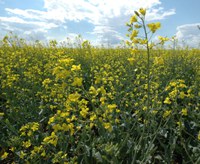NDSU Extension Offers Canola Production Information
(Click the image below to view a high-resolution image that can be downloaded)
North Dakota growers continue to be the No. 1 producers of canola in the U.S., planting nearly 1.6 million acres of the crop in 2018.
Canola is an edible type of rapeseed developed in the 1970s. Each canola variety has distinctive agronomic characteristics that producers should consider when selecting a hybrid to grow.
“Choosing a hybrid is one of the most important decisions a producer makes in raising a successful crop,” says Hans Kandel, a North Dakota State University Extension agronomist and co-author of NDSU Extension’s recently revised “Canola Production Field Guide.”
Key factors in choosing a canola hybrid are:
- Yield - Select hybrids with consistently high yields.
- Maturity - Some hybrids can mature 10 or more days later than others.
- Plant height and lodging - These are important for ease of swathing.
- Disease tolerance - Growing disease-resistant hybrids reduces the chances of yield loss.
- Seeding vigor - Hybrids with good seeding vigor will be more competitive with early season weeds and more likely to push through a shallow crust.
The updated “Canola Production Field Guide,” a spiral-bound pocket-sized publication, has more information about hybrid selection. Other topics covered in the publication include understanding the growth and development of canola plants, planting canola in crop rotations, field selection and preparation, planting date guidelines, seeding rates, frost tolerance and damage, soil fertility requirements, weed control, insect pest and disease management, swathing and harvest management, and drying and storage. The publication also lists websites and other resources with additional information, and has several photos of agronomy issues, weeds, insects and diseases.
“The previous field guide was published in 2011 and was in need of major updates, especially on the canola diseases of blackleg, sclerotinia and clubroot; canola insects; variety selection; weed management; desiccation at harvest; and other management issues,” Kandel says.
NDSU Extension specialists and NDSU agricultural researchers revised the guide.
North Dakota growers can obtain a free copy of the publication, as long as the supply lasts, from NDSU Extension’s county offices; the Research Extension Centers in Carrington, Dickinson, Hettinger, Langdon, Minot and Williston; or the NDSU Distribution Center on the NDSU campus. An online version of the guide is available at http://www.ag.ndsu.edu/pubs/plantsci/crops/a1280.pdf.
To purchase the publication, contact the NDSU Distribution Center at 701-231-7883 or by email at NDSU.DistributionCenter@ndsu.edu.
The Northern Canola Growers Association partially funded the “Canola Production Field Guide.”
NDSU Agriculture Communication - Feb. 19, 2019
| Source: | Hans Kandel, 701-231-8135, hans.kandel@ndsu.edu |
|---|---|
| Editor: | Ellen Crawford, 701-231-5391, ellen.crawford@ndsu.edu |


